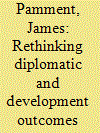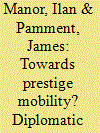| Srl | Item |
| 1 |
ID:
146047


|
|
|
|
|
| Summary/Abstract |
Sport diplomacy provides a challenging example of how diplomatic practice is changing in light of a proliferation of actors, agendas, and modes of communication. This context has inspired greater interest in techniques for managing the participation of others in the pursuit of desired outcomes, such as debates surrounding multi-stakeholder diplomacy, public diplomacy, and soft power. However, these debates often derive from an instrumentalist perspective of exerting influence and securing outcomes. Sport, on the other hand, involves sites and practices capable of supporting communities in the identification of their own goals, and of supporting the development of strategies and skills that can achieve those goals. Its participatory qualities challenge instrumentalist approaches to diplomatic objective setting, and potentially reveal some of the ways in which diplomacy can be more diffuse and inclusive. This article uses the example of sport diplomacy to question the basis for instrumentalist diplomatic objective setting and to explore the theoretical basis for participatory models of multi-stakeholder diplomacy.
|
|
|
|
|
|
|
|
|
|
|
|
|
|
|
|
| 2 |
ID:
167591


|
|
|
|
|
| Summary/Abstract |
This article responds to previous efforts to calculate diplomatic prestige while adapting these methodologies to the exigencies of digital diplomacy. In particular, we are interested in how digital diplomacy provides opportunities for diplomatic actors lacking in material resources to overcome prestige deficits. We adapt approaches used in earlier studies to calculate the material and ideational components of diplomatic prestige to the online sphere—in terms of presence, centrality and perceptions. By analysing the twitter accounts of 67 foreign ministries and 33 United Nations missions, we find that the traditional markers of diplomatic prestige do not automatically translate online, and that significant effort is required to maintain prestige in online diplomatic networks. We also find that the flexibility and transience of online networks do allow diplomatic actors a degree of prestige mobility. Hence, this study is highly significant for understanding how prestige is managed and strategically influenced in digital diplomacy.
|
|
|
|
|
|
|
|
|
|
|
|
|
|
|
|